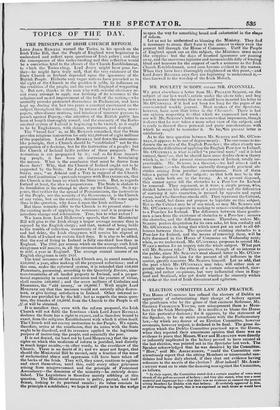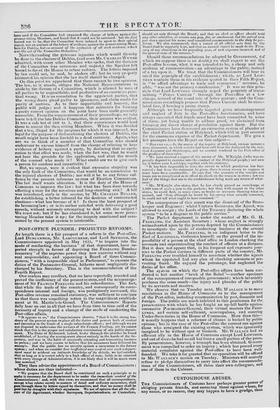ELECTION COMMITTEE LAW AND PRACTICE.
THE House of Commons has refused the electors of Dublin an opportunity of substantiating their charge of bribery against the gentlemen who by the grace of that eminent Reformer, Mr. GEORGE FREDERICK YOUNG, now misrepresent them as Mem- bers for the Irish Metropolis. It is needless to blame the House for this particular decision; for it appears, by the statement of the Speaker, to be in strict accordance with the Parliamentary law,—by which any decree of an Election Committee, however erroneous, however unjust, is declared to he final. The gross de- ception which the Dublin Committee practised upan the House, when they reported their unanimous opinion that there was no evidence to prove that Messrs. WEST and HAMILTON were directly or indirectly implicated in the bribery proved to have existed at the last election, was pointed out in the Spectator last week. The Speaker acknowledged that he was deceived by the Committee. "How," said Mr. ABERCROMBY, "could the Committee con- scientiously report that the sitting Members or unsuccessful can- didates had been duly elected, if they shut out evidence having reference to the merits of the election? How indeed! Mr.ABER- CRON= went on to state the damning case against the Committee, as follows.
" lu their report, the Committee stated that a certain number of votes were struck off the potion account of bribery ; and they also stated, what was a most material and important fact—that there was no evidence to connect the present sitting Members for Dublin with that bribery. it certainly appeared to hint, on first reading the report, that it was expressed in such terms as would have been uwl if the Committee had etcaminedl the charge of bribery against the present sitting Members, and found that it could not be sustained : but the fact turned out to he, that the Committee were induced to agree to their spetv.al report, not on account of the failure of evidence against the pi mist sitting Morn. here far Dublin., but on account of the exclusion of all suck evidence, which svsts the act of the Committee tkauselves." Notwithstanding the grievous injustice which would thereby be done to the electors 4 Dublin, (and even Mr. CHARLES .1117YNNE admitted, with every other Member who spoke, that the decision of the Committee was erroneous and unjust,) the Speaker felt bound to direct the House to refuse redress. The fetters imposed by law could not, he said, be shaken off; but he very properly intimated his opinion that the law itself should be changed. On this point we apprehend that there cannot be two opinions. The law, as it stands, obliges the National Representatives to abide by the dictum of a Committee, which is allowed by men of all parties to be unjustifiable, and productive of an enormous prac- tical wrong. It is no consolation to the aggrieved parties, that the wrong-doers plead guilty to ignorance, and claim credit fbr purity cif motives. As to their impartiality and honesty, the public will judge; and it happens that materials for funning a pretty correct opinion on the point have been made generally accessible. From the commencement of their proceedings, we take leave to tell the late Dublin Committee, their animus was evident. It was a safe bet of 500 to 1, that their consciences would lead them to unseat the then sitting Members. When it was decided that a tax, illegal for the purposes for which it was unposed, was legal for the purpose of disfranchising the electors of Dublin, the result might have been foretold to a dead certainty. Again, what .are we to think of a member of that Committee who should endeavour to excuse himself from the charge of refusing to hear evidence of bribery against a party, by declaring that no appli- cation to that effect was made, when the fact was, that he would not hear the grounds for the application, and shut the mouth of the counsel who made it ? What credit are we to give such a person for candour and impartiality ? But, we repeat, were it evident that excessive stupidity was the only fault of the Committee, that would be no consolation to the injured electors of Dublin; nor will it be to any future suf- ferers by the present infamous system of Election Committees. The law itself wants alteration. It is this duty of the House of Commons to improve the law : but what has been done towards effecting a cure for the notorious and long-standing evil ? A bill was introduced, early in the session, by Mr. CHARLES BULLER. for establishing a better tribunal for the decision of controvetted elections—what has become of it ? Is there the least prospect of its becominglaw ; or is its author satisfied with delivering a good speech, without seriously attempting to deal with the subject ? We trust not; but if he has abandoned it, let some more perse- vering Member take it up; for the iniquity sanctioned and occa- sioned by the present system is intolerable.



























 Previous page
Previous page